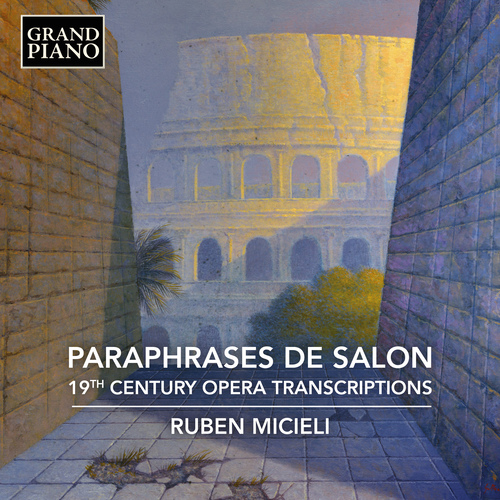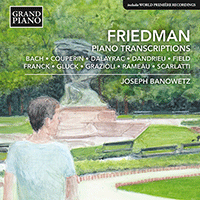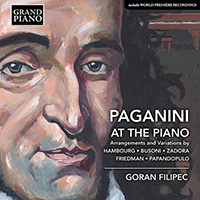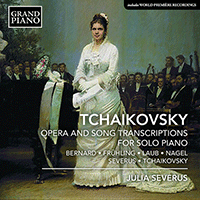
About this Release
Paraphrases de Salon – 19th Century Opera Transcriptions
Biehl • Leybach • Raff • Golinelli • Beyer
- Ruben Micieli, piano
The enduring appeal of opera in the 19th century found a new and intimate expression in the realm of solo piano music. This recording reveals how the grandeur and expressive range of operas by Bellini and Verdi was brought from the theatre into private parlours and salons. The composers featured on this album preserve the spirit of the original works while reimagining the famous melodies and dramatic scenes as paraphrases, fantasies and variations. Award-winning Italian pianist, Ruben Micieli, performs these dazzling pieces in his own unique way, making musical and structural adjustments to each transcription after studying the scores by Bellini and Verdi.
Tracklist
|
Biehl, Eduard
|
|
1
Fantaisie dramatique sur Il Trovatore de Verdi, Op. 8 () (00:10:18)
|
|
Leybach, Ignace Xavier Joseph
|
|
2
Fantaisie brillante sur I Puritani de Bellini, Op. 48 () (00:08:19)
|
|
Raff, Joachim
|
|
Trovatore et Traviata, 2 salon paraphrases after Verdi, Op. 70 (1857) (00:10:00 )
|
|
3
No. 1. Il Trovatore (00:04:40)
|
|
4
No. 2. La Traviata (00:05:33)
|
|
Golinelli, Stefano
|
|
5
La Traviata di Verdi, divertimento brillante, Op. 93 (arr. R. Micieli) (1853) (00:06:57)
|
|
Beyer, Ferdinand
|
|
6
3 Fantaisies brillantes sur des thèmes des opéras de Bellini, Op. 50: No. 3. I Capuleti e i Montecchi () (00:12:31)
|
|
Fumagalli, Adolfo
|
|
7
Melodia variata su La Traviata di Verdi, Op. 98 () (00:05:22)
|
|
Appiani, Eugenia
|
|
8
Ballata nell'opera Rigoletto di Verdi () (00:04:38)
|
|
Leybach, Ignace Xavier Joseph
|
|
9
Fantaisie brillante sur des motifs de l'opéra Norma de Bellini, Op. 65 (67) () (00:12:01)
|
The Artist(s)
 Pianist, conductor and composer, RUBEN MICIELI, has won over 40 international competitions, including Second Prize at the 9th International Franz Liszt Piano Competition Weimar-Bayreuth, and was a semi-finalist and received the Best Italian Award at the 66th Maria Canals International Music Competition. He has performed in prestigious venues across Europe and Asia, such as Teatro La Fenice, Weimarhalle, Palau de la Música Catalana, Salle Cortot and Auditorio ‘Víctor Villegas’, collaborating with renowned orchestras including the Staatskapelle Weimar and Filarmonica Arturo Toscanini. Micieli graduated with honours from the Conservatorio Bellini in Catania and the Academia Internacional de Música ‘Aquiles Delle Vigne’, studying with Giovanni Cultrera and Aquiles Delle Vigne, and has honed his craft with Michel Béroff, Piotr Paleczny, Roberto Prosseda, Boris Berman, Till Fellner, Jörg Demus, Andrzej Jasiński, Sergio Perticaroli, Leslie Howard, Yejin Gil and Carmelo Pappalardo.
Pianist, conductor and composer, RUBEN MICIELI, has won over 40 international competitions, including Second Prize at the 9th International Franz Liszt Piano Competition Weimar-Bayreuth, and was a semi-finalist and received the Best Italian Award at the 66th Maria Canals International Music Competition. He has performed in prestigious venues across Europe and Asia, such as Teatro La Fenice, Weimarhalle, Palau de la Música Catalana, Salle Cortot and Auditorio ‘Víctor Villegas’, collaborating with renowned orchestras including the Staatskapelle Weimar and Filarmonica Arturo Toscanini. Micieli graduated with honours from the Conservatorio Bellini in Catania and the Academia Internacional de Música ‘Aquiles Delle Vigne’, studying with Giovanni Cultrera and Aquiles Delle Vigne, and has honed his craft with Michel Béroff, Piotr Paleczny, Roberto Prosseda, Boris Berman, Till Fellner, Jörg Demus, Andrzej Jasiński, Sergio Perticaroli, Leslie Howard, Yejin Gil and Carmelo Pappalardo. The Composer(s)
 The reputation of Joseph Joachim Raff was once so high that during the 1860s and 1870s he was regarded by many as the foremost symphonist of his day. His breakthrough came in 1863 when both his First Symphony and a cantata won major prizes. From then on his reputation rose inexorably until in 1877 he became the founding director of the prestigious Hoch Conservatory in Frankfurt. Although primarily known, then as now, as a symphonist, Raff was prolific in most genres; operas, choral works, chamber music and songs abound in his catalogue but by far his largest output was for the piano: there are over 130 works for the instrument, many of them with multiple movements or numbers.
The reputation of Joseph Joachim Raff was once so high that during the 1860s and 1870s he was regarded by many as the foremost symphonist of his day. His breakthrough came in 1863 when both his First Symphony and a cantata won major prizes. From then on his reputation rose inexorably until in 1877 he became the founding director of the prestigious Hoch Conservatory in Frankfurt. Although primarily known, then as now, as a symphonist, Raff was prolific in most genres; operas, choral works, chamber music and songs abound in his catalogue but by far his largest output was for the piano: there are over 130 works for the instrument, many of them with multiple movements or numbers. Reviews

“This beautiful selection of 19th Century opera transcriptions is played exquisitely by Ruben Miceli. This entire disc is a pleasure to listen to whether you’re familiar with the operas and melodies or not. Mr Miceli’s playing is brilliant and often spectacular. I was so satisfied with this that I immediately played it a second time.” – American Record Guide

“There is quite a variety here… in the hands of a talent like Ruben Micieli these pieces shine brightly and would please any fan of Liszt or Thalberg… Micieli enhances them with some of his own touches…I find him a wonderful exponent and champion of this music and I hope he introduces us to more rarities from the romantic repertoire. This is a thoroughly enjoyable disc.” – MusicWeb International

“Micieli captures the mood of the opera scenes excellently. Each piece is interpreted with great sensitivity, and the pianist skilfully and effortlessly switches from one atmosphere to another.” – Pizzicato




 Grand Piano has gained a reputation for producing high quality recordings of rare keyboard gems. Dedicated to the exploration of undiscovered piano repertoire, the label specialises in complete cycles of piano works by many lesser-known composers, whose output might otherwise have remained unknown and unrecorded.
Grand Piano has gained a reputation for producing high quality recordings of rare keyboard gems. Dedicated to the exploration of undiscovered piano repertoire, the label specialises in complete cycles of piano works by many lesser-known composers, whose output might otherwise have remained unknown and unrecorded.






